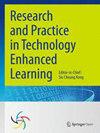了解学生在数字设备上的学业求助——一项定性分析
IF 3
Q1 EDUCATION & EDUCATIONAL RESEARCH
Research and Practice in Technology Enhanced Learning
Pub Date : 2022-11-16
DOI:10.58459/rptel.2023.18017
引用次数: 0
摘要
本科学生应该规范自己的学习过程,克服与知识相关的障碍。学术求助是一种获取缺失信息或解释的社会策略。由于移动设备是学生之间交流的一种流行手段,因此这些设备上的服务对计算机介导的学术HS很感兴趣。本研究的目的是确定支持请求和接受帮助的数字服务设计的需求。这篇文章介绍了学生对导致他们通过移动设备通过计算机媒介沟通寻求帮助的知识相关障碍的看法。此外,它还显示了受访者对寻求同伴帮助的感知抑制。最后,概述了流行服务的技术缺陷。从N = 59个半结构化访谈中获得的数据采用定性内容分析进行分析。学生们报告说,他们在做作业时遇到了与知识有关的障碍,当他们担心社会羞辱时,他们会避免HS。他们还报告说,HS最常使用的是信使服务。研究结果对计算机介导的学术HS领域的设计者和实践者具有一定的参考价值。本文章由计算机程序翻译,如有差异,请以英文原文为准。
Understanding students' academic help-seeking on digital devices - a qualitative analysis
Undergraduate students are expected to regulate their learning processes and overcome knowledge-related obstacles. Academic help-seeking (HS) is a social strategy to acquire missing information or explanations. As mobile devices are a popular means for communication between students, services on those devices are of interest for computer-mediated academic HS. The goal of the presented study is to determine requirements for the design of digital services that support asking for and receiving help. The article presents students’ perspectives on the knowledge-related obstacles that cause them to seek help through computer-mediated communication via mobile devices. Moreover, it presents respondents’ perceived inhibitions about asking peers for help. Finally, the perceived technical drawbacks of popular services are outlined. Data acquired from N = 59 semi-structured interviews were analyzed using qualitative content analysis. The students reported that they experience knowledge-related obstacles while working on assignments and that they avoid HS when they are worried about social humiliation. They also reported that a messenger service was used most frequently for HS. The results are valuable for designers and practitioners in the field of computer-mediated academic HS.
求助全文
通过发布文献求助,成功后即可免费获取论文全文。
去求助
来源期刊

Research and Practice in Technology Enhanced Learning
Social Sciences-Education
CiteScore
7.10
自引率
3.10%
发文量
28
审稿时长
13 weeks
 求助内容:
求助内容: 应助结果提醒方式:
应助结果提醒方式:


